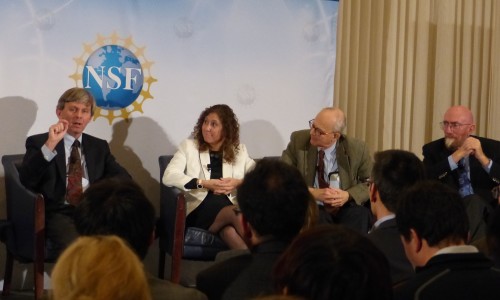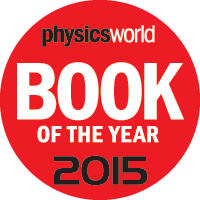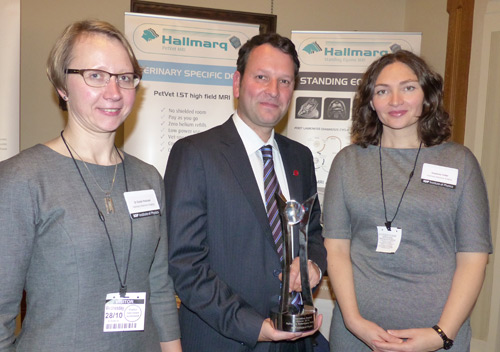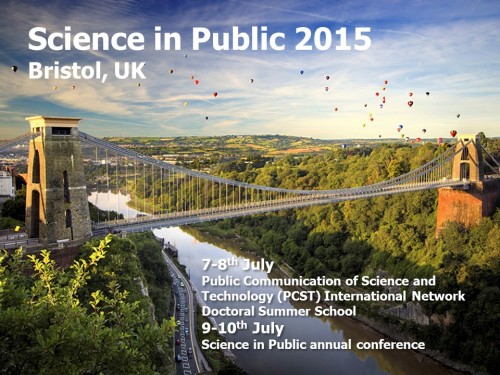Posts by: Margaret Harris
Science that goes ‘chirp’ in the night

LIGO leaders at the press conference (from left): executive director David Reitze, spokesperson Gabriela González, Rai Weiss and Kip Thorne.
By Margaret Harris at the AAAS meeting in Washington DC
Not with a bang, but a chirp.
That’s how the 2016 meeting of the American Association for the Advancement of Science (AAAS) kicked off on Thursday, thanks to the spectacular news that the Laser Interferometer Gravitational-wave Observatory (LIGO) has, for the first time ever, directly observed the ripples in space–time known as gravitational waves. As our news story explains, LIGO’s twin interferometers picked up the waveform produced as two black holes spiralled into each other, emitting gravitational waves at frequencies and amplitudes that rose sharply with time, like the chirp of a cricket.
The LIGO researchers announced their discovery at a packed press conference in downtown Washington, DC. The excitement in the room was palpable, even though, as it turned out, most of the journalists present already knew what they were about to hear. This actually isn’t unusual. It’s common practice for scientific journals to send new research papers to journalists a few days ahead of publication; the idea behind this so-called embargo system is that it gives journalists time to report accurately on complex science stories.
What was unusual was that this time, there was no embargoed paper. Instead, there was a vigorous rumour mill casting out information in a messy, somewhat underhand and highly anisotropic way. This is rather interesting, and I wish that LIGO’s Gabriela González hadn’t dismissed the journalist who asked about it with an incredulous “The facts are so beautiful – why do you talk about rumours?”
More data needed on the STEM ‘shortage’

(Courtesy: iStock/geopaul)
By Margaret Harris
“Science has always been the Cinderella amongst the subjects taught in schools…not for the first time our educational conscience has been stung by the thought that we are as a nation neglecting science.”
Sounds like something David Cameron or Barack Obama might have said last week, right? Wrong. In fact, it comes from a report by the grandly named Committee to Enquire into the Position of Natural Sciences in the Educational System of Great Britain, which presented its findings clear back in…1918.
I came across this quotation thanks to Emma Smith and Patrick White, a pair of education researchers at the University of Leicester who have spent the past few years studying the long-term career paths of people with degrees in science, technology, engineering and mathematics (STEM). Smith and White presented the preliminary findings of their study at a seminar in Leicester yesterday, and one of the themes of their presentation – reflected in the above quote – was the longevity of concerns about a shortage of STEM-trained people, especially university graduates. As Smith pointed out, worries about the number and quality of STEM graduates are not new and, historically, reports of a “STEM crisis” have been as much about politics as they have economic supply and demand.
View all posts by this author | View this author's profile
Solving your scientific identity crisis
By Margaret Harris
What kind of scientist are you? In a world where astronomers are getting into (exo)biology, geologists file their programming manuals next to their rock hammers and three physicists shared a chemistry Nobel prize for work with medical implications, it can be hard to keep track. But fear not. For behold, in the midst of this glorious interdisciplinary muddle (and, for many readers, the holiday season), we bring you tidings of great clarity. As it turns out, your scientific identity crisis can be solved with a simple flowchart.
The idea for the flowchart came last summer, when physicist Eugene Hickey submitted his ideas on sorting the geoscientists from the cosmologists to Lateral Thoughts, Physics World’s column of humorous and otherwise off-beat essays about physics and physicists. Hickey began his essay by observing that in his university (the Institute of Technology, Tallaght, near Dublin, Ireland) the interdisciplinary spirit has even trickled down to undergraduate level. For example, to create a materials-science degree, “the right physicist met up with the right chemist [and] decided to bolt together the best elements of both disciplines into a coherent bundle”. Students taking this degree, he added, “spent half their time in each department, like some sort of joint custody arrangement”.
View all posts by this author | View this author's profile
Top physics books of 2015
By Margaret Harris
 Well written, scientifically interesting to physicists, and novel: these are the criteria used to select Physics World’s annual list of the year’s top physics books. We’ve done this every year since 2009, and over the past few weeks, we’ve been at it again, sifting through the 52 books reviewed in the magazine in 2015 and separating the best from the rest (most of which, I should add, are also very good – we try not to review bad books).
Well written, scientifically interesting to physicists, and novel: these are the criteria used to select Physics World’s annual list of the year’s top physics books. We’ve done this every year since 2009, and over the past few weeks, we’ve been at it again, sifting through the 52 books reviewed in the magazine in 2015 and separating the best from the rest (most of which, I should add, are also very good – we try not to review bad books).
This is never an easy task, and as usual, the selections in our shortlist have been influenced by the views of external experts: the physicists, science writers and science historians who read and reviewed books for Physics World magazine throughout 2015. Their reviews (and, in a few cases, their private opinions) helped us decide which books deserved a closer look, and we thank them all for their contributions.
Deciding on a winner, however, is a privilege we reserve for ourselves, and with so many great books to choose from, it has been both a privilege and a challenge this year. We’ll be announcing our “Book of the Year” in a special edition of the Physics World podcast later this month, but in the meantime, here are the candidates:
View all posts by this author | View this author's profile
Leaping across the innovation divide

Glasgow’s Technology and Innovation Centre. (Courtesy: University of Strathclyde)
By Margaret Harris in Glasgow
If you’re the first speaker after lunch at a conference, how do you make sure your audience stays awake and engaged?
For Oliver Ambacher – who occupied the dreaded post-prandial slot during Wednesday’s applied photonics conference at Glasgow’s Technology and Innovation Centre (TIC) – the answer is simple. You pretend to jump off a cliff.
Ambacher, the director of the Fraunhofer Institute for Applied Solid State Physics in Freiburg, Germany, made his leap (actually, several leaps of varying lengths) to illustrate one of the toughest challenges in applied physics: the yawning gap between what academic researchers can provide, and what industry scientists need to turn that research into innovative products. This gap is sometimes called the “valley of death”, and Ambacher’s point was that the risks of leaping across it are generally higher on the industry side. “If I, whose heart is still in physics, jump into the valley of death, I lose funding, maybe a project,” Ambacher explained. “But somebody from industry, they may lose their job. So they cannot jump so far.”
View all posts by this author | View this author's profile
Horsing around with some innovative physics

(Left to right) Physicists Giedre Podolyak, Steve Roberts and Snezhana Chater of Hallmarq Veterinary Imaging celebrate their success in the IOP Innovation Awards.
By Margaret Harris
Imagine you’re a veterinarian and a trainer asks you to take a look at a horse. The animal, a champion showjumper, is limping slightly but there is no obvious injury. Exploratory surgery would probably do more harm than good, and the alternative – magnetic resonance imaging (MRI) – isn’t risk-free either. You’d need to put the horse under a general anaesthetic, and you know horses don’t react well to that; in fact, around 0.5% suffer serious injuries while coming round afterwards. And that’s assuming you can even find a scanner big enough to fit a horse. What do you do?
This might sound like a fairly niche dilemma, but for Hallmarq Veterinary Imaging it has become the basis for a thriving business – a business, moreover, that has just won an IOP Innovation Award for the successful application of physics in a commercial product.
At the awards ceremony – which took place last night in the Palace of Westminster, London, just down the hall from the House of Commons chamber – I caught up with Hallmarq’s operations and technical director, Steve Roberts. After sketching out the scenario of the veterinarian and the injured horse, Roberts, a physicist, explained that Hallmarq’s MRI scanner fits around the horse’s leg. This means that equine patients can simply be led into it, sedated but conscious. Sophisticated error-correction and image-processing software helps the scanner compensate for the horse’s movement, and in 15 years of operation, Roberts estimates that veterinarians have used Hallmarq’s machines to scan more than 60,000 horses.
Solarquest, Pluto and the importance of New Horizons
By Margaret Harris
Last night, in honour of the New Horizons mission to Pluto, I pulled out my copy of Solarquest. This classic board game was a childhood favourite of mine, and it’s basically Monopoly in space: instead of buying properties named after streets in Atlantic City, New Jersey (or London, if you’re British), you buy planets, moons and artificial satellites. Then, when your fellow players land on an object you own, you charge them rent.
Such nostalgia is all well and good, I hear you say, but what’s it got to do with New Horizons or Pluto? Well, Solarquest’s inventors clearly took their science seriously. By board game standards, there’s quite a lot of physics in it. For example, you can’t leave a planet unless you roll a number high enough to overcome its gravitational pull, and its Monopoly-like property deed cards include facts about each planet and moon as well as their prices.
Settling scientific disputes in public

By Margaret Harris
Here’s a Tuesday quiz for you. If you disagree with a colleague about something scientific, what should you do? Your choices are:
(a) Nothing. This is science, and the truth will win out no matter what I do;
(b) Take them aside and explain, privately, why you think they are wrong. Then, if they still disagree with you, get even by writing snarky anonymous reviews of their papers;
(c) Organize a panel “discussion” and tear them to shreds in front of all your colleagues;
(d) Take your case to the public by writing a popular-science book explaining the superiority of your own theory.
Okay, this is a trick question: I’m not sure any of those options is really a good idea (although I’m sure they’ve all been tried). I’d like to focus on the last one, though, because it was the subject of an interesting talk at the Science in Public conference, held last week in Physics World’s home city of Bristol.
View all posts by this author | View this author's profile
Success, failure and women in physics
By Margaret Harris
Giving out science careers advice is tricky. On the one hand, you want to be encouraging – not least because if you aren’t, there is a chance that your advisee will go on to win a Nobel prize, and you will then look extremely silly. But on the other hand, you also want to prepare the person, mentally, for the possibility of failure. Otherwise, when they do fall short, they may not know how to recover and try again.
The need for balance between encouraging big dreams and preparing for failure was one of the central insights to come out of Sunday’s panel on “Feminism, sexism and bringing up girls” at the Cheltenham Science Festival. After one of the panel members, psychologist Tanya Byron, noted that in clinical practice she sees many bright, successful girls whose fear of failure is “absolutely destroying them”, her fellow panellist Gabriel Weston put her finger on the heart of the problem. How, Weston asked, do we celebrate young women’s achievements and encourage their dreams without also pushing them to be “perfect little glass statues” who shatter under pressure?
View all posts by this author | View this author's profile
Elect a physicist

Cast your vote for the Physics Party. (Courtesy: iStockphoto/TylaArabas)
By Margaret Harris
It’s the issue no-one is talking about in the run-up to the UK’s general election on 7 May, but I’m convinced that a brand-new party is set to make significant inroads on the British political scene, increasing both its overall share of the vote and its number of parliamentary seats.
“What is this bold new force?” I hear you ask. “Is it the Green Party? The Scottish or Welsh nationalists? The UK Independence Party (UKIP)?” My friends, it is none of these. Nor is it the Conservatives, Labour or the Liberal Democrats (the three parties that traditionally grab the lion’s share of seats at Westminster), or any of the parties representing Northern Ireland. It is something far more novel. More interesting. And above all, more able to solve the Schrödinger equation.
I’m talking about the Physics Party.
View all posts by this author | View this author's profile

